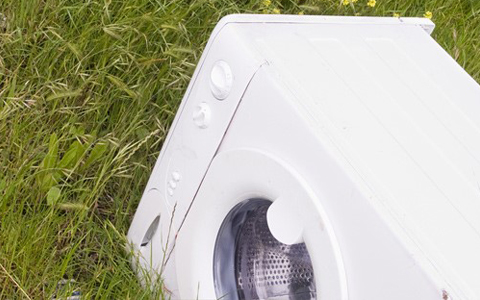Why buy when you can ‘servicize’?
Background
Project: SPREE
In industrial societies, consumption has traditionally been an end in itself. Growth is achieved by selling more products, but often also results in unnecessary waste, resource depletion, pollution and other environmental damage. It doesn’t have to be this way. Research by an EU-funded project indicates that a switch to a more service-oriented approach could be better for the environment and society as a whole, while boosting growth and competitiveness.

Given the clutter of things in many people’s garages, a little ‘servicizing’ could help clear some space – and benefit the environment. What if, for example, people could easily rent a lawnmower for a decent price from a neighbourhood cooperative instead of owning one?
People would not have to buy, store or service their lawnmowers. They would instead share the cost with neighbours who are also part of the cooperative – which would also provide reliable advice on the best time to cut a lawn and maintain it.
This switch from selling a product to providing it as part of a service is behind the concept of ‘servicizing’ as a sustainable, green business model for traditional manufacturing sectors. Servicizing a business sector involves transforming the primary aim from selling products to offering service transactions. Cooperatives are one application of servicizing, and there are many more.
But could servicizing work? The EU-funded project SPREE took up the challenge by developing case studies for three business servicizing systems – crop protection management, car and bike sharing, and grey water recycling and rain water harvesting systems.
The case studies based on research in Lithuania, the UK, Spain, Finland, Sweden and Israel fed into packages of policy proposals. SPREE’s economic simulations indicate these proposals would encourage servicizing in these sectors – and be better for the environment, while boosting growth and competitiveness.
The proposals are being disseminated at conferences and workshops, and in reports to policymakers across Europe. SPREE’s approach also provides a framework for further research into how appropriate servicizing would be for other business sectors, says project coordinator Eugenijus Butkus of the Research Council of Lithuania.
“By servicizing, suppliers may change the focus of their business models from selling products to providing services, turning demand for reduced material use into a strategic opportunity,” he explains. “This new approach is part of the larger move throughout business to the provision of services, which, evidence has shown, is linked to higher and more stable profits, and new opportunities for economic growth.”
On-the-ground research
In the agricultural sector, SPREE’s researchers studied the potential for applying servicizing to pest and disease management on rapeseed farms in Lithuania, and on the vineyards of Spain’s Rías Baixas region.
The researchers conducted surveys of farmers, agricultural companies and cooperative societies to gauge the social and economic barriers to change. They examined the potential benefits and costs of a switch to a system in which farmers would pay specialised providers for a pest-protected crop instead of purchasing the equipment and pesticides to carry out the work themselves, as is currently done.
Servicizing would lead to an integration of pesticide protection into an information-intensive service package, the researchers conclude. The package would be designed to reduce pesticide use while maintaining a high-level of crop protection.
SPREE reports that servicizing and the adoption of Integrated Pest Management (IPM) technology under EU rules could boost farm income, while reducing the use of chemical pesticides and related environmental impacts. IPM describes a range of techniques to control pests using safe, environmentally friendly approaches.
Crop protection companies would also benefit from increased profits after the initial costs incurred in making the transition to the servicizing model, SPREE concludes.
Policy recommendations to encourage the shift range from providing information to farmers on the advantages of outsourcing pest management to specialised companies, to new laws and incentives to reduce pesticide use while maintaining crop quality. In the transport sector, SPREE studied the potential implementation of car and bike-sharing services in the UK, Finland, Sweden and Israel.
Among SPREE’s recommendations to encourage the switch to car and bike sharing are restricting private cars entering city centres at peak hours, additional shared bike stations in car parks, and new rules and tax exemptions.
In the water sector, SPREE studied the potential servicizing of grey water recycling systems and rain water harvesting in the UK, Israel and Spain. ‘Grey water’ refers to waste water from such sources as baths, sinks and washing machines that has not been in contact with excrement.
SPREE’s policy proposals span a mix of incentives, new laws, and measures. These include building regulations to make systems to recycle water and collect rain water a requirement, and tax breaks for consumers who install such systems.
The researchers say servicizing would help reduce the consumption of water sourced from traditional water suppliers through mains, providing an overall environmental benefit and cost savings for consumers.
YouTube Video – SPREE The concept of SERVICIZING
YouTube Video – SPREE Servicizing in a Glance
This innovation was made possible by Israel’s continued participation in the official Horizon 2020 fund, managed in Israel by ISERD part of The Israel Innovation Authority (Formerly the Office of the Chief Scientist and MATIMOP). The initiative has taken Israeli R&D to the next level with the help of ground-breaking collaboration between scientists in Israel and Europe, as well as essential funding and support.
Project details
Project acronym: SPREE
Participants: Lithuania (Coordinator), Sweden, Spain, UK, Finland, Netherlands, Israel
Project Reference N° 308376
Total cost: €3 011 619,4
EU contribution: €2 399 663,2
Duration: July 2012 – June 2015
